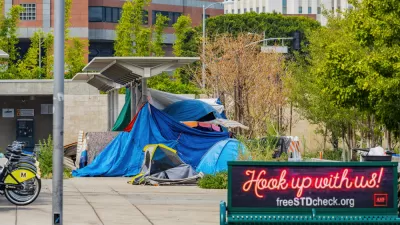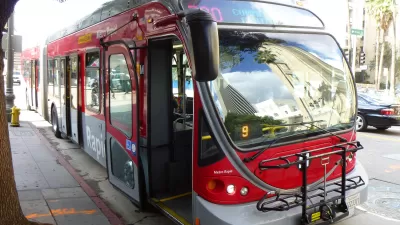Metro Los Angeles is rolling back public health measures on its buses systemwide in the middle of the worst Covid wave of the entire pandemic.

The Los Angeles County Metropolitan Transportation Authority (Metro) is resuming normal boarding operations on buses today. Since March 2020, the nation's second busiest bus system had been requiring passengers to use rear doors to board and light buses without paying fares.
An article by Ryan Fonseca for LAist provides details on the resumption of front door boarding on Metro, noting that rear door boarding and fare-free rides were implemented to protect riders and drivers during the pandemic: "Skipping the fares and requiring rear-door boarding made it possible to do a better job of social distancing."
Advocates are questioning the timing of the change, with Covid infections in the county higher than they've been at any point in the pandemic. Metro seems to be aware of the current public health risks, announcing on January 4 that it was canceling all enrollment events for its low-income fare program (not to be confused with a fare-free pilot program under consideration at Metro in 2021).
Fare-free transit has been one of the hottest topics in planning during the pandemic. Albuquerque last week announced the largest fare-free pilot program of any U.S. city to date.
FULL STORY: Free Bus Rides Are Ending On LA Metro. Check Out The Limited-Time Discounts Going Into Place

Planetizen Federal Action Tracker
A weekly monitor of how Trump’s orders and actions are impacting planners and planning in America.

San Francisco's School District Spent $105M To Build Affordable Housing for Teachers — And That's Just the Beginning
SFUSD joins a growing list of school districts using their land holdings to address housing affordability challenges faced by their own employees.

The Tiny, Adorable $7,000 Car Turning Japan Onto EVs
The single seat Mibot charges from a regular plug as quickly as an iPad, and is about half the price of an average EV.

Seattle's Plan for Adopting Driverless Cars
Equity, safety, accessibility and affordability are front of mind as the city prepares for robotaxis and other autonomous vehicles.

As Trump Phases Out FEMA, Is It Time to Flee the Floodplains?
With less federal funding available for disaster relief efforts, the need to relocate at-risk communities is more urgent than ever.

With Protected Lanes, 460% More People Commute by Bike
For those needing more ammo, more data proving what we already knew is here.
Urban Design for Planners 1: Software Tools
This six-course series explores essential urban design concepts using open source software and equips planners with the tools they need to participate fully in the urban design process.
Planning for Universal Design
Learn the tools for implementing Universal Design in planning regulations.
Smith Gee Studio
City of Charlotte
City of Camden Redevelopment Agency
City of Astoria
Transportation Research & Education Center (TREC) at Portland State University
US High Speed Rail Association
City of Camden Redevelopment Agency
Municipality of Princeton (NJ)





























